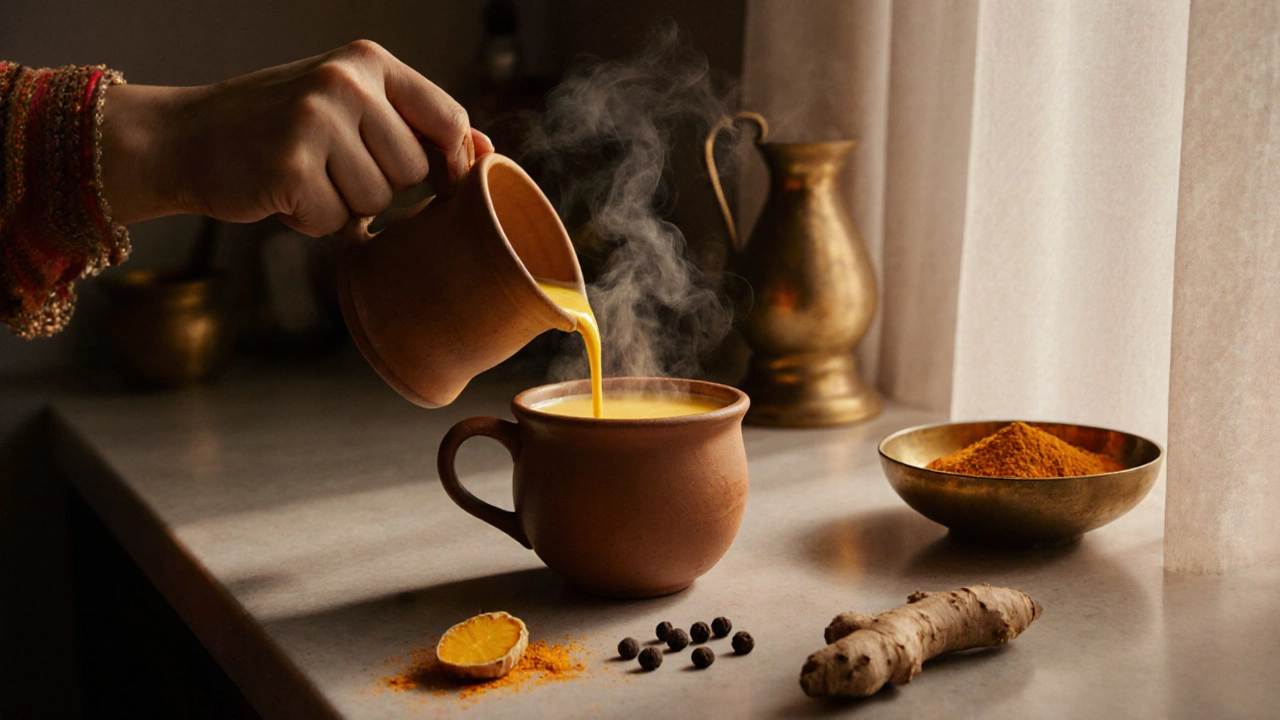Herb Recommendation Quiz
Discover Your Best Daily Herb
Take this quick quiz to find out which herb is best for your specific health needs. Based on scientific evidence and traditional use.
1. What's your main daily health concern?
2. Do you take any medications?
3. What's your preferred time to take supplements?
People ask this question all the time: What is the best herb to take daily? It sounds simple, but there’s no one-size-fits-all answer. What works for your neighbor might do nothing for you. The truth? The best daily herb depends on what your body actually needs-stress, inflammation, sleep, energy, or immune support. And not all herbs are created equal. Some are backed by decades of traditional use and modern science. Others are just trendy with little proof.
Why Daily Herbs Are Different from Supplements
Most people think of supplements as pills you take when you feel off. But daily herbs are different. They’re not meant to fix a problem overnight. They’re like food for your body’s systems-gentle, consistent, and cumulative. Think of them like brushing your teeth. You don’t do it because your mouth hurts. You do it to prevent problems.
Herbs like turmeric, ashwagandha, and holy basil don’t give you a quick buzz. They work over weeks and months. You won’t feel a difference on day three. But by day 30, you might notice you sleep deeper, your joints feel looser, or you don’t snap at your kids as much. That’s the power of daily herbal support.
Turmeric: The Anti-Inflammatory Powerhouse
If you have any kind of chronic ache-knees, back, even brain fog-turmeric might be your best daily bet. Its active ingredient, curcumin, has been studied in over 12,000 scientific papers. One 2021 meta-analysis in the Journal of Medicinal Food showed curcumin reduced joint pain as effectively as ibuprofen in people with osteoarthritis, but without the stomach irritation.
Here’s the catch: turmeric doesn’t absorb well on its own. That’s why most quality supplements include black pepper extract (piperine). Piperine boosts curcumin absorption by up to 2,000%. You can also take it with a meal that has healthy fats-like coconut oil or avocado-to help your body use it better.
People in South India have used turmeric daily for centuries. In Bangalore, it’s common to see families add a pinch to warm milk before bed. That’s not just tradition. It’s science. Daily turmeric helps lower inflammation markers like CRP and IL-6. Over time, that means less wear and tear on your body.
Ashwagandha: The Stress Shield
If you’re constantly tired, wired at night, or feel like you’re running on fumes, ashwagandha is the herb you need. It’s an adaptogen-a plant that helps your body handle stress better. In a 2019 randomized trial published in Indian Journal of Psychological Medicine, adults taking 240 mg of ashwagandha daily for 60 days reported a 69% drop in anxiety symptoms and a 27% drop in cortisol levels.
It doesn’t make you sleepy. It doesn’t make you hyper. It just brings your nervous system back into balance. People who take it daily often say they stop reacting to small stressors. A missed bus doesn’t ruin their day. A work email doesn’t trigger panic.
Take it in the morning or early afternoon. Some people report mild stimulation if taken too late. Start with 300-500 mg of a standardized extract (with at least 5% withanolides). Avoid it if you’re pregnant or have an overactive thyroid.
Holy Basil (Tulsi): The Immunity and Mental Clarity Herb
In India, holy basil isn’t just a herb. It’s part of daily life. Many homes grow it near the entrance. It’s used in teas, in cooking, even in rituals. And for good reason. Holy basil has been shown to support immune function, reduce blood sugar spikes, and calm the mind.
A 2022 study in Phytomedicine found that participants who took 500 mg of holy basil extract daily for eight weeks had better focus, lower stress, and higher antioxidant levels than the placebo group. It’s especially helpful if you’re dealing with seasonal allergies, frequent colds, or mental fog from screen overload.
Unlike ashwagandha, holy basil is gentle enough to take at night. It doesn’t interfere with sleep. In fact, many people find it helps them wind down. Brew the leaves in hot water, or take a capsule. Either way, it’s one of the safest herbs for daily use.

Other Daily Herbs Worth Considering
Not everyone needs the same thing. Here are three more herbs that fit well into a daily routine, depending on your goals:
- Ginger: Great for digestion and nausea. Helps with morning sickness, motion sickness, and bloating. A 1-gram daily dose reduces muscle soreness after workouts.
- Green Tea Extract: Not a root or leaf you chew, but a concentrated form of the tea you drink. Provides EGCG, a powerful antioxidant that supports brain health and metabolism. Stick to 250-500 mg daily. Avoid if you’re sensitive to caffeine.
- Reishi Mushroom: A quiet immune modulator. Not a stimulant. Helps the body respond better to infections and reduces chronic inflammation. Best taken at night. Takes 4-8 weeks to notice effects.
What to Avoid
Not every herb is safe for daily use. Some can interfere with medications or cause side effects over time:
- St. John’s Wort: Great for mild depression, but it interacts with birth control, blood thinners, and antidepressants. Not for daily use unless under supervision.
- Ephedra: Banned in many countries. Too risky for long-term use.
- Kava: Can damage the liver with prolonged use. Avoid daily unless monitored by a doctor.
Also skip products with “proprietary blends.” If the label doesn’t say how much of each herb is in there, you’re guessing. Look for standardized extracts with clear dosages.
How to Start Taking Herbs Daily
Don’t take five herbs at once. That’s how people get overwhelmed-and confused about what’s working. Start with one. Pick the one that matches your biggest daily struggle:
- Joint pain or swelling? Try turmeric with black pepper.
- Constant stress or sleep issues? Try ashwagandha.
- Always catching colds or brain fog? Try holy basil.
Take it at the same time every day. Morning or night-it doesn’t matter as long as it’s consistent. Give it 30 days. No changes? Try a different herb. No results after 60 days? It might not be right for you.
Buy from brands that test for heavy metals and pesticides. Look for third-party certifications like USP, NSF, or ConsumerLab. Cheap herbs from unknown brands can be contaminated or diluted.

Real-Life Results: What People Actually Experience
In Bangalore, I’ve seen clients report real changes:
- A 52-year-old teacher took turmeric daily for three months. Her knee pain dropped from a 7/10 to a 2/10. She started walking again.
- A 38-year-old software engineer switched from coffee to holy basil tea in the morning. His afternoon crashes vanished. He stopped reaching for sugar.
- A 45-year-old woman took ashwagandha for anxiety. After two months, she stopped taking her prescription anti-anxiety pill. Her doctor approved it.
These aren’t miracle cures. They’re steady improvements. The kind you get when you treat your body like something worth caring for-not just fixing when it breaks.
Can You Take Multiple Herbs Together?
Yes, but carefully. Turmeric and holy basil? Safe. Ashwagandha and reishi? Fine. But don’t mix more than two or three at first. Track how you feel. Some herbs can have overlapping effects. Too much of the same kind of support can make you feel sluggish or overly calm.
Also, avoid taking herbs with the same mechanism. For example, don’t take both ashwagandha and valerian root daily if you’re already feeling tired. You might overdo the calming effect.
When to Stop
Herbs aren’t forever. You don’t need to take them for life. Some people cycle them: three months on, one month off. Others take them only during stressful seasons-like winter or exam time.
Stop if you feel worse. If you get a rash, nausea, or feel unusually drowsy, quit. It might be the herb, or it might be a bad batch. Always talk to your doctor if you’re on medications. Herbs can interact with blood thinners, thyroid meds, and diabetes drugs.
Is it safe to take herbs every day?
Yes, if you choose the right ones and use them properly. Turmeric, ashwagandha, and holy basil have been used safely for centuries. Stick to standard doses and avoid unknown brands. Always check for interactions if you’re on medication.
How long does it take for daily herbs to work?
Most people notice subtle changes after 2-4 weeks. Stronger effects-like reduced pain or better sleep-usually show up by week 6-8. Herbs work slowly because they support your body’s natural systems, not override them.
Can I replace my medication with herbs?
No. Herbs are not replacements for prescribed medications. They can complement them, but never substitute without medical advice. For example, turmeric may help with joint pain, but it won’t replace a DMARD for rheumatoid arthritis. Always talk to your doctor before making changes.
Which herb is best for sleep?
Ashwagandha helps reduce the stress that keeps you awake. Reishi mushroom supports deeper, more restorative sleep. Holy basil is calming without being sedating. For immediate sleep help, consider magnesium or melatonin-but those aren’t herbs. Herbs work best as long-term sleep supporters, not quick fixes.
Are there any side effects of daily herbs?
Generally, no-if you use quality products and stick to recommended doses. Rare side effects include mild stomach upset, headaches, or allergic reactions. Avoid herbs like kava or St. John’s Wort if you’re on other meds. Always watch how your body responds.
Where should I buy daily herbs?
Buy from brands that list exact dosages and have third-party testing (USP, NSF, or ConsumerLab). Avoid Amazon generic brands or unregulated online sellers. Look for extracts, not powdered herbs, unless you’re making tea. In India, brands like Himalaya, Organic India, and Baidyanath are widely trusted.
Next Steps: What to Do Today
Don’t wait for the perfect plan. Start small.
- Identify your biggest daily issue: pain? stress? fatigue? brain fog?
- Choose one herb that matches it.
- Buy a quality supplement or fresh herb.
- Take it at the same time every day for 30 days.
- Write down how you feel each week.
That’s it. No need for expensive kits or complicated routines. Just one herb. One habit. One month. You might be surprised what a small daily choice can do.

 What’s Taking Over from Metformin in Diabetes Care?
What’s Taking Over from Metformin in Diabetes Care?
 Psychologist vs Therapist: Which Mental Health Expert Is Right For You?
Psychologist vs Therapist: Which Mental Health Expert Is Right For You?
 Unveiling the World's Riskiest Heart Surgeries: Insights and Precautions
Unveiling the World's Riskiest Heart Surgeries: Insights and Precautions
 Using US Health Insurance Abroad: What You Need to Know
Using US Health Insurance Abroad: What You Need to Know
 Herbs You Should Never Mix Together
Herbs You Should Never Mix Together